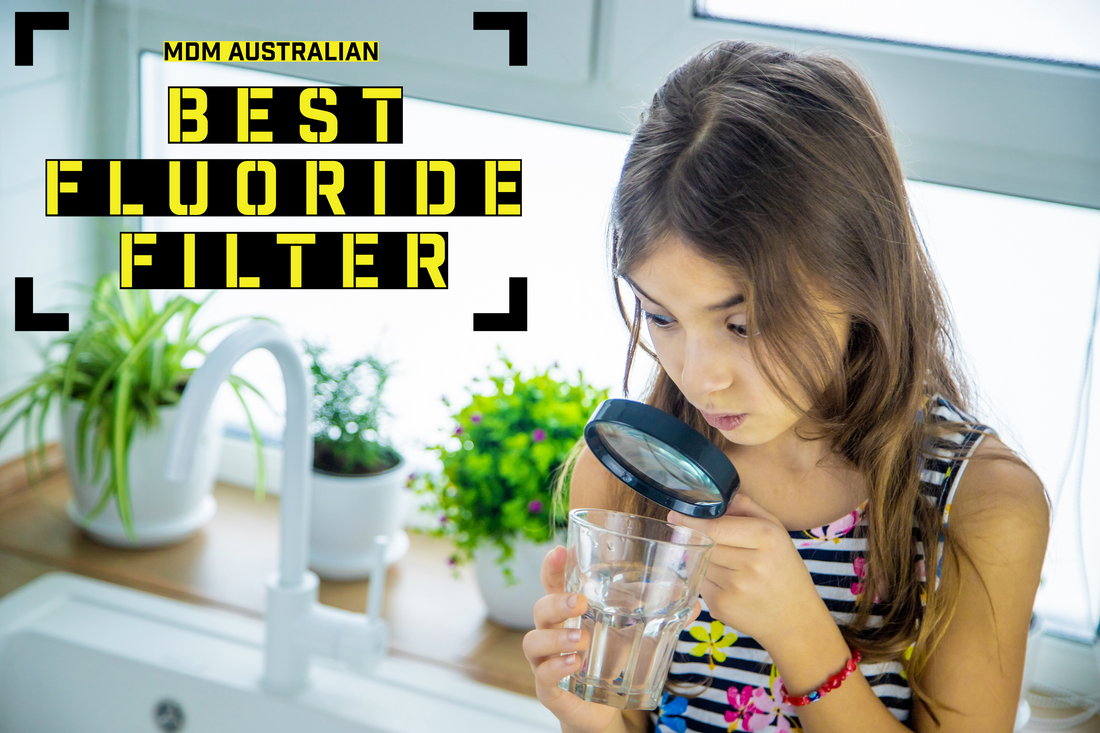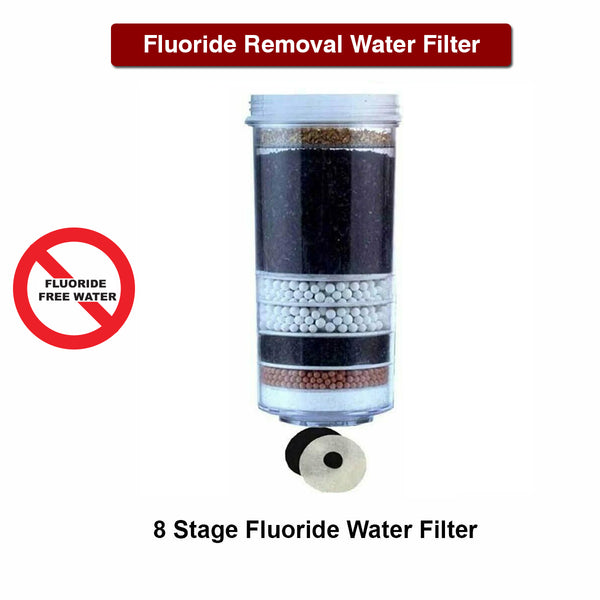
3 BEST FLUORIDE WATER FILTERS IN AUSTRALIA
Share

The Best Water Filters to Remove Fluoride in Australia
Are you worried about what's in your drinking water? Fluoride in Australia's tap water may pose health concerns. Picture fresh water pouring freely, untainted. But fluoride lurks an unseen foe. If ensuring safe, pure water for your loved ones matters, finding the ideal fluoride filter is vital.
This guide explores fluoride removal systems, empowering you to enjoy clean water straight from the tap. We'll examine Australia's top options—reverse osmosis, ion exchange resin, and activated alumina filters. Read on, arm yourself with knowledge, and confidently choose the filter safeguarding your family's well-being.
Discover top-rated fluoride water filters, backed by expert insights and reviews. Sip pure refreshment, worry-free. Your household's health is paramount; the right filter provides peace of mind.
Introduction to Fluoride Water Filters
Fluoride water filters are essential for clean, safe drinking water. As awareness grows about potential fluoride risks in tap water, people seek effective solutions. Naturally occurring fluoride often added to public supplies for dental health, can pose dangers if consumed excessively.
Dental fluorosis and potential bone issues make some wary of fluoride. Many now aim to eliminate fluoride from their drinking water. Specialized filters offer a solution, removing this mineral for worry-free hydration.
Fluoride water filters are specifically designed to reduce or eliminate fluoride content in drinking water, providing a practical solution for those concerned about potential health implications. These filters use various techniques such as reverse osmosis, activated alumina, and ion exchange resins to effectively remove fluoride from the water supply.
By investing in a reliable fluoride water filter, you can ensure that your drinking water is free from excess fluoride, providing peace of mind and maintaining your family's health and well-being. In the following sections, we will explore different types of fluoride water filters available in the market, their effectiveness, and our top recommendations to help you make an informed decision and find the best fluoride water filter for your needs.
What is Fluoride and Why Remove It?
Fluoride is a naturally occurring mineral found in water sources, including tap water. It is often added to public water supplies as a preventive measure to reduce tooth decay. While fluoride has proven benefits for dental health, excessive exposure to fluoride can have adverse effects on overall health.
The Potential Health Risks of Fluoride:
1. Dental Fluorosis: Excessive fluoride consumption during tooth development can lead to dental fluorosis, a condition characterized by white spots, streaks, or discoloration on teeth. Although generally cosmetic in nature, severe cases can result in pitting and enamel erosion.
2. Chronically high fluoride intake negatively affects bones and joints. This condition, skeletal fluorosis, causes joint stiffness, pain, and restricted movement.
3. Endocrine disruption may occur due to fluoride exposure. Some research indicates it can hinder hormone production and regulation.
4. Cognitive development and neurobehavioral function might be impacted by excessive fluoride consumption, though evidence is inconclusive.
These potential health risks motivate individuals to remove fluoride from tap water, ensuring safer drinking water.
The Importance of Removing Fluoride:
1. Personal preferences, such as health concerns, beliefs, or cultural reasons, may prompt fluoride avoidance.
2. Those with sensitivities or allergic reactions to fluoride need removal for well-being.
3. Removing fluoride allows control over water quality consumed. Areas with naturally high fluoride levels or water fluoridation programs especially benefit.
4. Eliminating fluoride from tap water helps manage overall intake, as it's present in various sources.
Fluoride removal from tap water is crucial. Know its risks and filter benefits for informed water purification decisions. Invest in effective filters that cut fluoride levels safely while ensuring clean drinking water.
Replace cartridges and follow guidelines regularly. This maintains the system's ability to remove fluoride and other contaminants.
Sources:
- Fluoride in Drinking Water: A Scientific EPA Standards Review (National Research Council, 2006).
- Benefits and Risks of Fluoridated Drinking Water (Barker, McClure, & Kruger, 2011).
- Fluoride: Prevalence and Prevention Strategies (Kumar et al., 2018).
- Endemic Fluorosis in India Overview (Khandare et al., 2016).
- Long-Term Water Fluoridation Effects on the Human Skeleton (Chachra et al., 2010).
- Fluoride: Developmental Neurotoxicity (Green et al., 2019).
- Risks and Benefits of Fluoride in Dental Care (Limeback, 2013).
- Developmental Toxicity's Neurobehavioral Effects (Grandjean & Landrigan, 2014).
Types of Fluoride Water Filters
To remove fluoride from tap water, various fluoride water filters exist. Each has pros and cons. Let's examine the most common types:
1. Reverse Osmosis Systems
Systems that use reverse osmosis process water effectively get rid of fluoride. They make water travel through a special barrier. This barrier only lets pure water through but blocks fluoride and other contaminants. Reverse osmosis can remove up to 95% of fluoride from tap water. But, it removes good minerals too and wastes some water.
2. Activated Alumina Filters - 8-Stage Fluoride Water Filter
Another good choice for fluoride removal uses activated alumina filters. These work by a process called adsorption where fluoride sticks to the alumina surface. They can remove up to 95-99 % of fluoride. A benefit is that they don't remove minerals needed in water.
3. Ion Exchange Resins
Ion exchange resins swap out fluoride ions for other ions, often chloride. The resins contain beads or resin beds fluoride ions stick to. While removing fluoride, they may not be as effective as reverse osmosis or activated alumina.
Consider each fluoride water filter type's pros and cons before choosing. Think about installation needs, maintenance required, and filter lifespan too. Get a tested and certified brand for reliable fluoride removal.
Picking a fluoride water filter requires considering not just fluoride removal but also safe drinking water provision.
Fluoride Water Filter Option 2
For the best fluoride water filter in Australia, Option 2 stands out. It's an advanced filtration system removing fluoride, ensuring clean, safe drinking water.
Features
Option 2 offers impressive features, making it a top household choice:
1. Advanced tech: activated alumina and ion exchange resins effectively target, remove fluoride contaminants. 2. Easy installation: designed for hassle-free setup with clear instructions, components. 3. High capacity: large filter cartridge handles significant water before replacement - long-lasting fluoride removal solution. 4. Durable: high-quality materials withstand daily use, rust-resistant for longevity.
Filtration Process
Fluoride Water Filter Option 3 utilizes a filtration system with multiple stages. This process ensures the effective removal of fluoride. Here's a breakdown:
Pre-Filtration: Large particles, sediments, debris - the system removes these first. Cleaner water then proceeds to the next stages.
Primary Filter Pad- removes rust, sediment and prevents propagation of bacteria
KDF- Removing Fluoride, chlorine, pesticides, organic matter, and heavy metals.
Activated Charcoal- Using an absorption method activated charcoal is one of the most effective materials at removing chlorine, organic sediment, and unpleasant smells and odors.
Layers of Ceramic Minerals- bringing water's Ph level closer to that of the human body creating slightly alkaline water, providing substantial levels of pure and rich minerals vital for the bodies function, anti-aging benefits, and creating great tasting water among other benefits.
Activated Alumina- Removes up to 95% of fluoride
Ceramic Plate- Removes bacteria and parasites.
Customer Satisfaction
Customers report high satisfaction with Filter Option 3's performance. Many notice improved taste, and quality in their drinking water. They feel reassured, knowing fluoride is effectively removed.
Unique Benefits
One unique advantage: Filter Option 3 removes various contaminants besides fluoride. It targets impurities like chlorine, heavy metals, bacteria, harmful chemicals. Comprehensive water filtration.
Additionally, this system operates quietly with minimal upkeep. Busy households appreciate its convenience, ease of use.
In conclusion, Fluoride Water Filter Option 3 is an exceptional choice for those looking for a reliable and efficient solution to remove fluoride from their tap water. Its advanced filtration technology, easy installation, high filtration capacity, and customer satisfaction make it a top contender in the market. Consider this fluoride water filter to ensure clean and safe drinking water for you and your loved ones.
Buying Guide for Fluoride Water Filters
When it comes to choosing the right fluoride water filter for your home, there are several important factors to consider. By understanding these factors and evaluating your specific needs, you can make an informed decision and ensure that you find the best fluoride water filter for clean and safe drinking water. Here's a comprehensive buying guide to help you through the process:
1. Filtration Technology
The first thing to consider is the filtration technology used in the water filter. There are various types available, including reverse osmosis systems, activated alumina filters, and ion exchange resins. Each technology has its own unique advantages and disadvantages. For example, reverse osmosis systems are highly effective at removing fluoride but may require professional installation. Activated alumina filters are cost-effective and easy to maintain but may have a lower filtration capacity. Ion exchange resins provide long-lasting filtration and versatility but may not remove other contaminants as effectively.
2. Filtration Performance
After that, gauge the water filter's ability to eliminate contaminants. Seek filters specially made to remove fluoride and proved effective through certification. Estimate the filtering capacity and ensure it suits your household's needs. Don't overlook the flow rate - it should supply enough filtered water without compromising efficiency.
3. Lifespan and Maintenance
Consider how long the filter cartridge lasts before needing replacement. Some require changing every few months, while others can endure a year or more. Additionally, factor in maintenance ease and whether special tools or expertise are required for cartridge swaps.
4. Installation and Compatibility
Verify the fluoride water filter's installation needs. Certain systems demand professional installation, while others allow for DIY setup. Guarantee compatibility with your plumbing system and any unique requirements from your water source.
5. Budget and Operating Costs
Weigh your budget when purchasing a fluoride water filter. Prices fluctuate based on brand, tech, and features. Don't forget ongoing costs like replacement cartridges and any extra maintenance expenses.
6. Customer Reviews and Ratings
Examine customer feedback and ratings. This gives insight into overall contentment and water filter performance. Search for comments on fluoride removal efficiency, durability, user-friendliness, and customer service quality.
Accounting for these factors enables an informed decision when purchasing a home fluoride water filter. Evaluate your specific requirements and prioritize the important aspects. With the right filter, enjoy clean, fluoride-free, and contaminant-free drinking water.
Frequently Asked Questions about Fluoride Water Filters
Q: Are fluoride water filters necessary?
A: Fluoride water filters are essential for ensuring clean, healthy drinking water. Many areas add fluoride to tap water to prevent tooth decay. However, excessive fluoride ingestion can adversely impact health, causing dental fluorosis. A fluoride water filter helps reduce or eliminate fluoride from drinking water, providing a safer option.
Q: How do fluoride water filters work?
A: Fluoride water filters employ various filtration methods to remove fluoride from tap water. One common technique is activated alumina filtration, where activated alumina adsorbs fluoride ions onto its surface. 8 Stage Water Filter also effectively eliminate fluoride by forcing water through a semipermeable membrane, blocking contaminants like fluoride. Some filters utilize ion exchange resins or other technologies for fluoride removal.
Q: Can fluoride water filters remove other contaminants besides fluoride?
A: Yes, many fluoride water filters are designed to remove multiple contaminants, including chlorine, heavy metals, pesticides, and more. However, the specific effectiveness of these filters may vary. It's essential to choose a fluoride water filter that is certified to remove fluoride and other contaminants, ensuring comprehensive filtration for your drinking water.
Q: How often should I replace the filter in a fluoride water filter system?
A: The replacement frequency for fluoride water filters depends on the specific system and filter cartridge. Some filters require replacement every Six months, while others may last up to a year or more. It's crucial to follow the manufacturer's instructions regarding filter replacement to ensure optimal performance. Regularly replacing the filter is essential to maintain the filtration efficiency and effectiveness of the fluoride water filter.
By addressing these frequently asked questions, we aim to provide you with clarity and essential information about fluoride water filters. If you have additional queries or concerns, please feel free to reach out to us.


